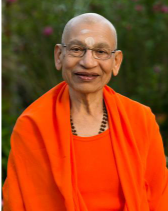
Spirituality
 By Swami Viditātmānand Saraswati*
By Swami Viditātmānand Saraswati*
Free from all needs and always happy
Explaining how a sthitaprajña (wise person) walks around, meaning how he transacts with viṣaya, Bhagavāna says that because his mind is free from rāga-dveṣa, his senses are in control of his own mind and his mind is in control of his discriminative intellect. When this wise person with an integrated personality enjoys viṣayas that are essential and not forbidden by śāstra, he feels joy.
Where there is no rāga-dveṣa, there is cleanliness and transparency and such a clean and transparent mind is naturally happy. One who possesses such a mind can enjoy everything because he does not have any demands, he does not ask for anything to be different from what it is. He himself is free from all the needs and therefore, he is always happy.
Also read: Spiritual discourses: What is karmayoga and where is the sin?
It is important to gain such a joyful state of mind. All the sorrow of an aspirant with a joyful mind gets destroyed. The ādhyātmika, ādhibhautika adversities also cannot raise any sorrow in him. Such an undisturbed tranquil mind can abide in ātmajñāna (self-knowledge). A joyous mind can be in our own control and the readiness for ātmajñāna can arise in it. It can gain the knowledge and it can achieve the natural peace arising from jñānaniṣṭhā. Happiness is only where there is peace, meaning, where there is freedom from all the desires and impulses.
How can there be happiness in the mind which is restless due to the desires and impulses arising from those desires? One whose mind is wandering in the sensual objects, that mind takes away any discrimination power from his intellect. Meaning, the discrimination power cannot be of any use. Therefore, the mind should be freed from the influence of viṣayas by neutralizing rāga-dveṣa. By doing this, the mind becomes stable and can abide in the knowledge.
Jīvanamukta
The jñānī (wise person) who is freed from all desires becomes selfless. He does not have mamakāra, which means ownership. He does not have an affinity toward things that are necessary for sustenance. He does not have pride of scholarliness. Therefore, freed from all the conflicts and adversities, pleased by the self and others, this person gains lasting peace in the form of freedom from all sorrow.
He becomes the nature of brahman. This is the brāhmī state gaining which he never gets deluded. Because where there is light of knowledge, ignorance or delusion cannot be possible. At the end of life also, being in this state, when prārabdha is exhausted and the body falls, he attains videha kaivalya, brahmanirvāṇa, meaning brahmapada, and gains freedom from the cycle of birth and death forever.
In this manner, in the second chapter, Bhagavāna depicted the discrimination between ātma-anātma as a definite solution of freedom from sorrow. As a solution for that knowledge, He depicted karmayoga and in the end, He described a sthitaprajña who is abiding in the ātmajñāna and therefore free from sorrow.
*Swami Viditatmananda Saraswati has been teaching Vedānta Prasthānatrayī and Prakaraṇagranthas for last 40 years in Ahmedabad, Gujarat. Throughout the year, he conducts daily Vedānta discourses, accompanied by retreats, and Jñāna Yajñas on Vedānta in different cities in India and in foreign countries.





